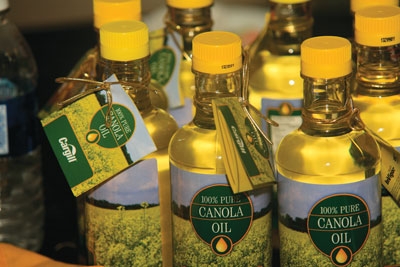
Features
Agronomy
Other Crops
Specialty canola continues to evolve
Each year, the demand for high oleic canola oils continues to increase – well beyond the increase in population. With growing scrutiny on public health, particularly obesity in children, the market for healthier vegetable oils remains strong.
In the specialty canola oil sector, three companies lead the way – Cargill, Bayer CropScience and Dow AgroSciences. Each of these companies has varieties in the market today that have the high oleic oil profile.
According to Blaine Woycheshin, Bayer CropScience manager of oilseed crops, the company entered the specialty canola oil business for a very simple reason – demand.
“Consumers today are increasingly interested in their health, and they’re more cognizant of where their food comes from,” he says. “With the demand for heart health cooking oils, we saw a great opportunity to offer our growers higher returns through access to these premium markets with InVigor Health.”
Bayer is aligned with Cargill in their specialty canola business. Rick Wiebe, marketing manager for Cargill, says constant research and innovation is key to ensure growers – and end users – are getting the best possible product.
“The main focus in developing hybrids for our growers is increasing yields and disease resistance, making sure they have varieties that are agronomically stable, and are at par or better than the best commodity varieties,” he says. “As for the end product, we’ve recently launched a higher oleic content canola, Clear Valley 80 oil, with the highest stability of a canola oil on the market today. This increases the shelf life of the oil, and really makes that taste come through.”
Bayer has two specialty canola hybrids available in the Cargill Specialty Canola program: InVigor Health L156H and InVigor Health 1145 both contain LibertyLink technology, allowing growers to benefit from the yield potential of a hybrid combined with the high-stability oil profile required for contract premiums. “With both products, growers get reliable maturity, and premier lodging and weed resistance, to generate more bushels from every acre,” says Woycheshin.
According to Wiebe, the greatest incentive for growers is higher returns from producing specialty canola. “Growers can earn higher returns by growing specialty canola with our higher-yielding InVigor Health and VICTORY hybrids in a simple program that offers a premium over classic canola,” he notes, adding that a good grower support system from Bayer and Cargill is also an incentive.
“Making sure we have satisfied grower customers is really important because for the end-use customer, we have to have an assured supply of oil,” he says. “We need to make sure our growers come back every year so we’re sure we produce enough oil to meet demand from our oil customers.”
Along with Bayer’s territory managers and market development reps, Cargill dedicates seven specialty canola territory managers, six in Western Canada and one in North Dakota. In addition, Cargill AgHorizons offers the elevator systems and retail distribution system in Western Canada.
Agronomics, special handling and contracting
For the most part, growing specialty canola doesn’t require different management from an agronomic standpoint. Like classic canola types, specialty canola hybrids come with their own set of various traits, depending on the company and the hybrid in question. But there are a few simple steps that need to be done as the crop comes off the field.
“Management of specialty canola is really easy; farmers can manage it like any canola crop,” says Wiebe. “But they do need to keep it segregated from any classic canola they might be growing. Also, at sampling and harvesting, farmers need to make sure they take that step and do both properly.”
For instance, growers need to ensure they don’t have any mixes in the field at planting, i.e., specialty canola mixed with classic canola. Also, growers need to harvest the specialty crop separately, bin it separately and submit samples after harvest.
Cargill contracts a limited amount of specialty canola each year, ensuring they meet supply and demand with end-use customers. “Cargill is the only company that manages the entire high oleic canola supply chain,” says Wiebe. “Being the only company that is both a seed and an oil supplier allows us to work directly with growers to manage supply and quality. This helps ensure our oil customers receive the ingredients they need at the right specifications.”
The demand for both classic and specialty canola oil continues to increase in the marketplace. As a result, Cargill is building a new crush plant at Camrose, Alberta. The plant will have capacity to process 850,000 metric tons of canola per year, and is expected to be ready for the 2014/15 crop marketing year. Cargill already operates the country’s largest canola-crushing plant at Clavet, Saskatchewan.
“With the continued demand in growth in North America and offshore for canola oil and meal, this offers great opportunities for canola growers in Western Canada,” says Wiebe. “As well, strong demand pull in North America from biofuels and specialty oils puts Canadian canola in an enviable supply position.”
January 22, 2013 By Janet Kanters
 Continued demand for canola oil offers great opportunities for canola growers in Western Canada. Each year
Continued demand for canola oil offers great opportunities for canola growers in Western Canada. Each year